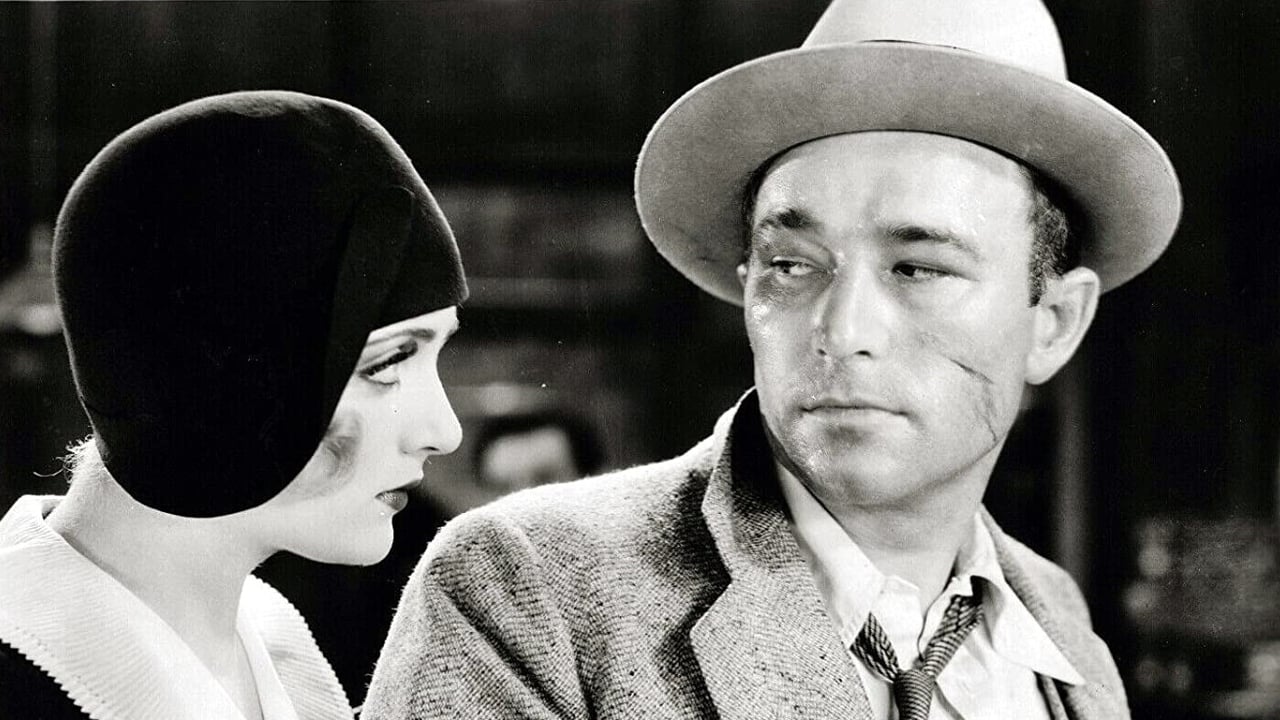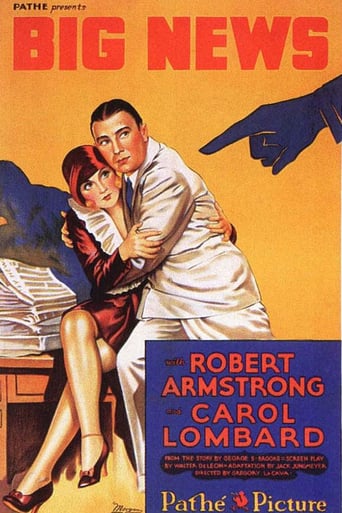

Plot so thin, it passes unnoticed.
... View MoreExcellent but underrated film
... View MoreThe movie runs out of plot and jokes well before the end of a two-hour running time, long for a light comedy.
... View MoreThis is a gorgeous movie made by a gorgeous spirit.
... View MoreThe snap, crackle and pop you are hearing isn't your cereal bowl. It's the soundtrack of this nearly 90 year old film that is trying really fast to capture the magic of the Broadway play "The Front Page". The only thing it really offers is a glimpse into the early days of sound films and early appearances of future stars Robert Armstrong ("King Kong") and 30's superstar Carole Lombard, here without that unique "e" at the end of her first name. This deals with the daily goings on at an oddly run news room where there seems to be more drinking going on and playing around than actual journalism. Static camera work can't help a lot of pre-code dialog, much of it recited by an initially funny butch newspaper woman who is told by the editor not to be so "gay". After a while, this obvious novice becomes a real pest. Lombard really gets nothing juicy to work with as Armstrong's divorce seeking wife, while he really overacts.
... View MoreEven though Carole Lombard was steadily catching the public's eye and picking up good notices she realised there was no long term future for her at Pathe. They were too busy grooming Ann Harding and Constance Bennett into stars and from the look of 1929 it seemed as though she and Robert Armstrong were going to be developed into a team!! Fortunately by the next year she was at Paramount and destined for better things.I don't think there would have been much incitement to seriously portray the effects of alcoholism at the height of prohibition - and with Robert Armstrong as the star there were going to be just as many laughs and wisecracks as serious moments. But no one told Carole and, surprisingly, she gives the film it's thoughtfulness.This is a "Battle of the Sexes" between husband and wife, "rival reporters" Margaret and Steve Banks - Margaret is the dedicated reporter of the Morning Herald who has just scooped her husband out of a "love nest, chorus girl, dope ring" story, he has just been fired by the Express because of too much time spent in speakeasys!!! The "dope" angle is more interesting - yes, in pre-coders there is often references to dope, hop heads, snowbirds etc but not to base the main story of a movie about it - unless it was one of those under the counter exploitation movies!! After being sacked once and for all, Steve storms out of Addison's office and makes good his promise to find a story that "will turn this town on it's ear" - the confession of a chorus girl Rose Perreti, exposing a big dope ring but soon after when Addison is found dead in his office all fingers point to Steve who has been set up by racketeer Joe Reno (Sam Hardy) who wants Steve out of the picture forever!!Special mention goes to "blink and you miss him" Lew Ayres as a copy boy. And Cupid Ainsworth who has the best role in the film as Vera, the paper's resident "sob sister". She has wise cracks for every occasion and bats off derogatory comments about her weight like Babe Ruth. There is even a conversation about being gay - Vera, with her very masculine looks and style of dress, is told to go and "be gay like I know you can be"!!!
... View MoreSteve Banks is a hard-drinking newspaper reporter. His wife Margaret, a reporter for a rival paper, threatens to divorce him if he doesn't quit the drinking that is compromising his career. Steve pursues a story about drug dealers even when his editor fires him. When the editor is murdered, Steve is accused of the killing. But Steve has an ace up his sleeve that may save him from the electric chair. Does this sound like a comedy? That's where IMDb puts it. It's a weird and dumb movie.
... View MoreRobert Armstrong and Carole Lombard star in this early talky about the newspaper business. Armstrong plays an obnoxious drunk who, inexplicably, Lombard loves. He constantly shoots off his mouth and you wonder why the paper puts up with him. By the end of the film, however, he's redeemed himself and shows that he's a darn find newspaper man.The film is odd in the way it portrays Armstrong as a relatively high-functioning and lovable alcoholic. In some ways, it seems to excuse his addiction and presents a very odd and convoluted message. It's also odd in that one of the characters seems to be that of a very manly lesbian. Both are things you never would have seen in a Hollywood film once the toughened Production Code was enacted in mid-1934--when alcoholism needed to be punished and lesbians needed to vanish.So is the film any good? Well, in spots it's quite good and in others it lets the viewer down. A few of the performances are poor (such as when the murder is discovered near the end of the film) but the overall plot is engaging and worth seeing. But, for 1929, it's actually quite good--had it been made a year or two later, I would have given it a slightly lower score.For folks like me who simply watch too many movies, it also was a thrill to see Tom Kennedy play a SMART policeman—as he almost always played very stupid ones!
... View More